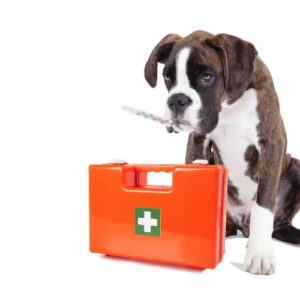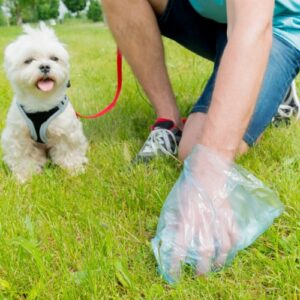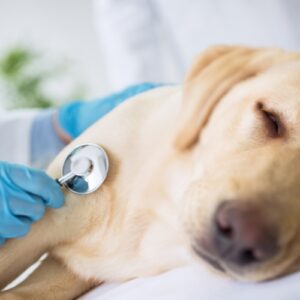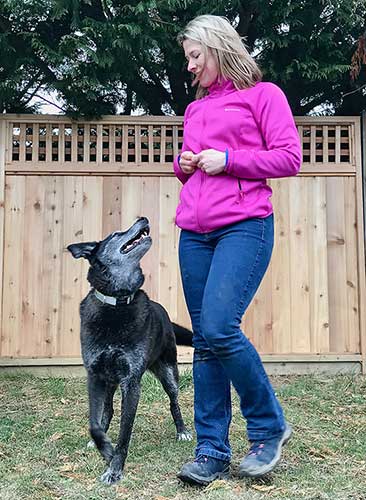Giardia in dogs – the bane of many a puppy parent’s existence.
Giardia in dogs seems to be much more common around Rutland, Vermont than we’ve encountered in Massachusetts. And contracting it while your puppy is young prevents them from fully taking part in group classes during the short but crucial socialization window. Getting rid of the parasite once contracted can be tough. In this post we focus on how you can prevent getting it in the first place and then avoid spreading it to others.
What is Giardia?
It’s a parasite – not a worm, bacteria or virus. Giardia infects the intestine and both people and dogs can get it. People often pick up Giardia when they drink contaminated water and it’s often the cause of traveler’s diarrhea. Coccidia is another parasite that causes intestinal disease.
What are the symptoms?
While diarrhea and vomiting are common symptoms of Giardia in our dogs, that’s not always the case. A dog can be asymptomatic. But typical signs to watch out for include:
- Sudden onset foul-smelling diarrhea
- Weight loss
- Gas
- Fatty stool
- Stool may be soft to watery, have a greenish tinge, might contain blood
- Vomiting
- Lethargy
- Abdominal discomfort
For some dogs, the parasite can attach itself in the gut of the animal and potentially cause damage to the intestinal wall. And while it’s not usually life-threatening it can be in very young or immune-compromised dogs.
Testing and treatment
Your vet should test for Giardia specific antigens.
Typical drugs given to treat Giardia are: Fenbendazole (Panacur®) and metronidazole. And retesting will be carried out 2 to 4 weeks after treatment. Given the nature of contamination, it is vital that you pick up the feces of infected dogs immediately and bathe infected animals regularly to ensure infected cysts don’t continue to exist on their bodies. Use a shampoo like Chlorhexidine because your dog can easily reinfect himself through grooming if cysts exist on his fur. Your dog can also pass a form of Giardia on to you so good hygiene is crucial.

Pick up your dog’s poop to limit the spread of disease.
How does a dog get it?
Dogs contract Giardia when they consume cysts that have been shed in feces (including excrement from other animals like foxes and deer). They can contract Giardia by eating or sniffing cysts from contaminated ground or drinking contaminated water. Yup, sniffing contaminated grass could be enough for your dog to contract the illness. But they are also at risk rolling or playing in contaminated soil. Unfortunately, these cysts can survive months in damp conditions – welcome to Vermont!
How to prevent contraction and stop the spread
- Pick up your dog’s poop! This is the easiest thing we can all do and we should be doing it anyway.
- Ask your breeder for proof of negative fecal for Giardia – this should be specifically tested for. Alternatively, seek a fecal test that includes testing for Giardia from your local vet. Please wait for the results before taking your dog to new places. The test result should be back within days so spend that time getting your new dog comfortable at home. Yes it’s exciting to get out and show off your new dog, but please do everyone else a favor and get that confirmation of clear fecal before spreading an illness.
- As best you can, try and keep a puppy’s potty area free of feces from other animals.
- Prevent your dog from ingesting potentially contaminated water, food or soil. We know, puppies put everything in their mouth. But here are a couple of tricks – use toys to distract your pup. If his mouth is on a ball or tug toy he can’t be eating feces at the same time. Use your pup’s kibble to train him throughout the day. Rather than just putting food in his bowl, get your dog used to working with you for his food while he’s out and about. Again he’s less likely to be putting his mouth around something inappropriate if he’s being kept busy earning his meals.
- Avoid highly trafficked areas where you do not know the health of other dogs – avoid dog parks and hiking trails for example. Young puppies shouldn’t be taken to such places in any event – there is too great a risk of your dog having a bad experience. But also keep in mind the risk of them contracting or spreading something.
- Follow the veterinarian’s advice on treatment exactly – ensure you are giving prescribed drugs as directed and retest as required. Some vets think the current strains of Giardia are more resistant to treatment – this can happen if you don’t administer dosages properly.
- If your dog does have Giardia, please don’t continue taking him to public places. Socialize your dog from the safety of your car or while you carry pup. But continuing to take your pup out and about while he has Giardia only increases the risk of another dog contracting the illness.
- Regularly (daily if possible) clean and disinfect your pup’s toys, water & food bowls, bedding, crates and areas where it spends much of its time.

If you’re worried about your dog’s health, speak to your vet.
This article offers helpful information about Giardia but we are not veterinarians. If your dog has symptoms, or you are in anyway worried about their health, contact your local vet. Sources we relied on include:
https://www.cdc.gov/giardia/about/about-giardia-and-pets.html


